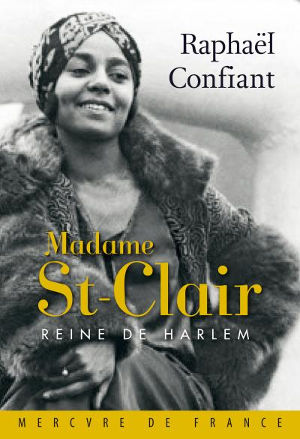
"STEPHANIE ST-CLAIR, REINE DE HARLEM" de Raphaël Confiant, publié aux éditions Mercure de France en septembre dernier, figure sur la liste des 10 meilleures livres caribéens publiés en cette année 2015, toutes langues confondues (anglais, espagnol, français, néerlandais)...
In.Madame St-Clair: Reine of Harlem (Mercure de France), veteran Martiniquan novelist Raphael Confiant spins a gripping and fascinating story based on the little-known life of Madame St. Clair, a Martiniquan immigrant to Harlem who rose to become a top boss in the Mafia at the height of Harlem Renaissance and the Jazz Age of the roaring ‘20s. This book’s still only available in French.
Read our interview with Dimitry Elias Léger here.
It’s a good time to be a writer from the Caribbean. Major publishers and critics used to select only one writer from the region every couple of generations and have that guy, they were mostly guys, speak for all of us, pretending there weren’t other writers with other takes on life in and around our watery region. Worst, Caribbean writers were placed in silos according to their language and rarely crossed over. Aimé Césaire and Frantz Fanon were the only widely read writers from the French Caribbean for decades. Similarly, Cuba’s Alejo Carpentier and Barbados’s George Lamming were standard bearers for Spanish and English Caribbean literature respectively. The same way the world was slow to check out other Caribbean singers besides Bob Marley, Caribbean writers, other than the first stars and Trinidad’s V.S. Naipaul, struggled to emerge.
Today, thanks to various forces, most notably the explosive growth in number of creative writing programs, and literature in general in America since 1990, the literary grandchildren of those pioneering Caribbean writers are emerging in greater numbers, and with a range of voices. Readers can find classically tragic Caribbean novels. They can also find classically ribald ones. And they can also find perfectly funny-sad Caribbean stories across genres too, with young adult, poetry, and science fiction joining literary fiction with settings and accents that hopscotch across islands, America and Europe, in creolized English, French, and Spanish. Best of all, book lovers can now meet an equal number of women and men writers with authoritative voices about the human condition and la vida loca caribeño.
There’s more work to be done. American and English publishers still don’t translate enough of the Haitian and non-English-writing Caribbean writers who put out significant and steady books. The French and Spanish and other international publishers have the reverse problem. They’re far behind America in embracing the new stars of the 21st century Caribbean canon.
Scroll through for the Caribbean laureates of 2015.
Source : http://www.largeup.com/2015/12/10/toppa-top-10-books-caribbean-authors-2015/